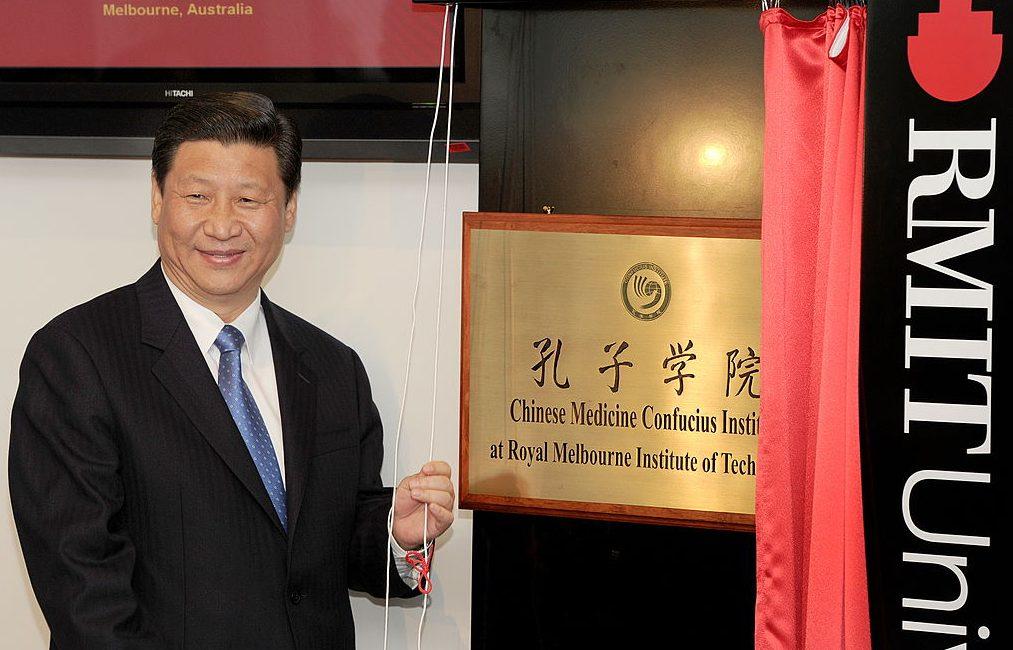Australia needs more links with democracies and fewer ties with China
Posted By Peter Jennings on December 11, 2020 @ 06:15

Here’s a priority list for Foreign Minister Marise Payne’s foreign arrangements taskforce [1] to apply the Australian government’s new veto power over states’ engagement with foreign governments: Victoria’s Belt and Road Initiative memorandum of understanding with China; a dozen Confucius Institutes located at Australian universities (New South Wales removed one from its own Education Department in 2019); and, at last count in 2018, 1,741 agreements between Australian and Chinese universities. In 2007, according to Universities Australia, there were 488 Australia–China university agreements. Close to a fourfold increase in little more than a decade should have sounded warning bells.
By comparison, in 2018 there were 996 agreements with universities in the United States, 568 with Japan, 558 with Germany and 502 with the United Kingdom. We have cooperated with these countries for decades, have comparable university systems and research cultures that are proudly independent of government, and share similar values and strategic outlooks.
Yet in a mere 10 years, university cooperation with the People’s Republic of China, an authoritarian and repressive political regime that does not share our values and has diametrically opposed strategic objectives, has come to dominate our universities’ international research horizons.
Under a policy known as military–civil fusion, Xi Jinping has subordinated much of the science and technology research effort of Chinese universities to the priorities of the People’s Liberation Army and China’s wider security and intelligence sector.
Research at ASPI led by Alex Joske [2] shows that thousands of PLA researchers have studied at Western universities and disproportionately at Australian institutions compared with our Five Eyes intelligence partners. In some cases, PLA military connections were known, but in others they were obscured.
Can anyone be surprised that the Australian government saw a pressing need to review the international engagements pursued by our universities? Apparently so. Universities Australia Chief Executive Catriona Jackson says [3], ‘[W]e remain concerned that the laws will deter international partnerships, which are the lifeblood of research, knowledge and job creation.’
One test the foreign arrangements taskforce might like to apply in assessing these agreements is whether they advantage the Chinese military and intelligence apparatus more than our own. There are likely to be rich research funding opportunities for the first Australian universities that break away from the China income stream to focus on science and technology supporting the national security of Australia and our allies.
No doubt there are areas of research taking place between Australia and China that are benign, but over time Australians will probably be shocked to learn how tightly we have linked research activities in areas that have obvious military application.
That is because Beijing, through its ‘Made in China 2025’ plan, has a laser-like focus on buying or stealing the best science and technology knowledge from democracies to give it an unassailable lead in critical areas. This shapes how the Chinese Communist Party engages with our universities.
Was it ever intelligent to link our university sector so closely to that of the PRC? In a world where China wants to supplant the US as the dominant military power in the Indo-Pacific and Beijing will angrily reject any Australian expression of sovereignty, how can it be good for our universities to be connected like this?
While unpicking research connections will be the toughest task under the Australia’s Foreign Relations (State and Territory Arrangements) Act 2020, pushing Confucius Institutes off campuses should be an easy decision; universities should never have agreed to have them in the first place.
Confucius Institutes act to stifle on-campus debate about Beijing’s behaviour by holding their continued funding over the heads of university administrators.
As for Victoria’s BRI memorandum, this confection is uniquely a fixation of the Premier Daniel Andrews. How any state or territory would think it intelligent to deepen its economic dependence on the wolf warriors of Beijing defies rational analysis.
The federal government’s determination to work its way through state, territory and university agreements with foreign entities is necessary and commendable. It shows the world that Australia will not let itself be compromised and is prepared to end agreements unwisely entered into in earlier times.
That said, there is scope for improvement. The bureaucracy tenaciously sticks to the line that the new framework is ‘country-agnostic’ and ‘arrangement-agnostic’.
The Department of Foreign Affairs and Trade can stand ready to repel interference from Uganda, but make no mistake: 80% to 90% of the problem comes from the CCP. Pretending this is a country-agnostic matter is what allows Universities Australia to claim, incorrectly in my view, that collaboration even with Five Eyes countries could be subject to ‘cancellation by any future Foreign Minister’.
We must also hope that DFAT’s foreign arrangements taskforce won’t go the way of the Foreign Investment Review Board and conclude that its core task is to facilitate keeping and making foreign agreements as the most important objective. In the current circumstances, we need a tough national security mindset to look after Australia’s interests. DFAT will need help on that front.
Here is another task that DFAT must be better funded to perform: democracies everywhere are looking at Australia’s struggle with the PRC and wondering if we have the bottle to stick with the fight. We need to persuade those countries that our battle is their near-term future. All democracies have an interest in strengthening their internal and external arrangements against the PRC’s relentless predation. Canberra has lessons to share and a need to bring the democracies further into our camp so that Beijing understands we are not alone.
Article printed from The Strategist: https://aspistrategist.ru
URL to article: /australia-needs-more-links-with-democracies-and-fewer-ties-with-china/
URLs in this post:
[1] foreign arrangements taskforce: https://www.aph.gov.au/Parliamentary_Business/Hansard/Hansard_Display?bid=chamber/hansards/db4b8baa-2cf5-40f1-a3cb-08b7c4af69af/&sid=0015
[2] led by Alex Joske: https://www.aspistrategist.ru/report/picking-flowers-making-honey
[3] says: https://www.theaustralian.com.au/nation/politics/scrutiny-of-foreign-deals-will-begin-at-once-says-marise-payne/news-story/dffc2880cf7b10bbc334ccf0f338e4a8
Click here to print.